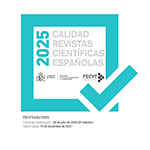Gilles Deleuze y la “verdad de la verdad”: pensar las fuerzas
Abstract
En este artículo, estudiaremos la concepción de la verdad en Gilles Deleuze, a partir de su estrecha conexión con las fuerzas reales que producen el pensamiento. Primeramente, rastrearemos algunas claves de la crítica deleuzeana a la representación, centrándonos en su lectura de la filosofía platónica y en su oposición a la “imagen dogmática del pensamiento”. La forma de pensar representativa deriva en una determinada concepción de la verdad, a la que Deleuze se opone radicalmente. Como veremos, no se tratará de negar lo verdadero, sino de ligarlo con una “verdad de la verdad” que determina su valor según las múltiples fuerzas del pensamiento. A modo de conclusión, se distinguirán tres sentidos en la noción deleuzeana de verdad, y se pondrá en duda la suficiencia de los criterios propuestos por su pensamiento para distinguir entre las fuerzas y formas de vida que están detrás de toda verdad.
Downloads
##submission.format##
Lizenz
La revista Logos. Anales del Seminario de Metafísica, para fomentar el intercambio global del conocimiento, facilita el acceso sin restricciones a sus contenidos desde el momento de su publicación en la presente edición electrónica, y por eso es una revista de acceso abierto. Los originales publicados en esta revista son propiedad de la Universidad Complutense de Madrid y es obligatorio citar su procedencia en cualquier reproducción total o parcial. Todos los contenidos se distribuyen bajo una licencia de uso y distribución Creative Commons Reconocimiento 4.0 (CC BY 4.0). Esta circunstancia ha de hacerse constar expresamente de esta forma cuando sea necesario. Puede consultar la versión informativa y el texto legal de la licencia.











